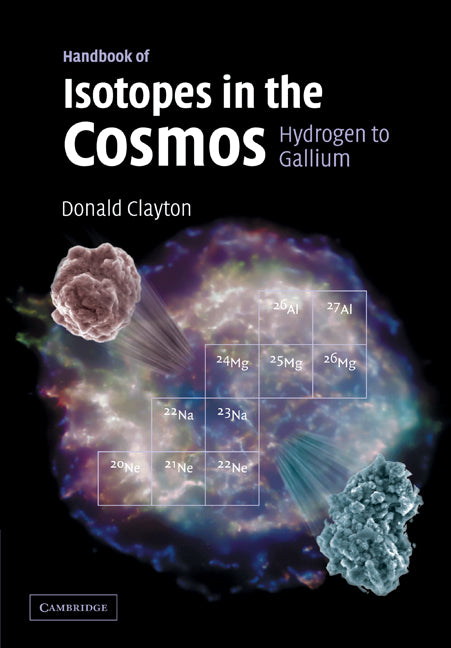Freshly Printed - allow 6 days lead
Couldn't load pickup availability
Handbook of Isotopes in the Cosmos
Hydrogen to Gallium
An information resource about the isotopes and their place in the cosmos.
Donald Clayton (Author)
9780521530835, Cambridge University Press
Paperback, published 16 August 2007
328 pages, 8 b/w illus. 30 tables
24.4 x 17 x 1.7 cm, 0.53 kg
'… a unique information resource for scientists.' Orion
Each naturally occurring isotope has a tale to tell about the history of matter, and each has its own special place in cosmic evolution. This volume aims to grasp the origins of our material world by looking at the abundance of the elements and their isotopes, and how this is interpreted within the theory of nucleosynthesis. Each isotope of elements from Hydrogen to Gallium is covered in detail. For each, there is an historical and chemical introduction, and a table of those isotopes that are abundant in the natural world. Information given on each isotope includes its nuclear properties, solar system abundance, nucleosynthesis in stars, astronomical observations, and isotopic anomalies in premolar grains and solar-system solids. The book is suitable for astronomers, physicists, chemists, geologists and planetary scientists, and contains a glossary of essential technical terms.
List of illustrations
Preface
Introduction
1. Hydrogen (H)
2. Helium (He)
3. Lithium (Li)
4. Beryllium (Be)
5. Boron (B)
6. Carbon (C)
7. Nitrogen (N)
8. Oxygen (O)
9. Fluorine (F)
10. Neon (Ne)
11. Sodium (Na)
12. Magnesium (Mg)
13. Aluminium (Al)
14. Silicon (Si)
15. Phosphorous (P)
16. Sulphur (S)
17. Chlorine (Cl)
18. Argon (Ar)
19. Potassium (K)
20. Calcium (Ca)
21. Scandium (Sc)
22. Titanium (Ti)
23. Vanadium (V)
24. Chromium (Cr)
25. Manganese (Mn)
26. Iron (Fe)
27. Cobalt (Co)
28. Nickel (Ni)
29. Copper (Cu)
30. Zinc (Zn)
31. Gallium (Ga)
Glossary.
Subject Areas: Environmental science, engineering & technology [TQ], Geochemistry [RBGK], Inorganic chemistry [PNK], Astrophysics [PHVB], Atomic & molecular physics [PHM], Cosmology & the universe [PGK]


